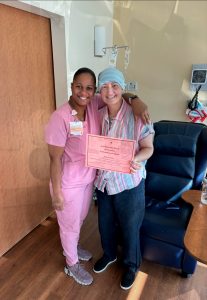It was a quiet winter afternoon, January 4, 2024, one Kim Thacker remembers with remarkable clarity. Sitting in an armchair in her living room, she had left work early, feeling more tired than usual. At 3 p.m., her phone rang. It was her radiologist.
“I was expecting a call at some point,” Thacker recalls, “but nothing prepares you for hearing the word cancer.”
She had undergone a series of breast biopsies the previous week, but the official diagnosis, invasive lobular carcinoma, hit like a wave she could hardly absorb. “It took months to process it,” she says. “In many ways, I’m still processing it.”

Within days of that life-changing call, Thacker and her husband sat face-to-face with her care team at UConn Health. They walked through every detail of her diagnosis, translating the language of her scans into something human, something understandable. That clarity, she says, was essential.
“My only symptom was fatigue,” Thacker shares. “I had no lumps, nothing visible or palpable. It turns out that’s typical for my cancer type, which grows in strands rather than forming a mass. If I hadn’t gone in for my routine mammogram, it might have gone undetected for a long time.
At just 42 years old, this was only Thacker’s second mammogram. That screening likely saved her life.
From the very beginning, Thacker felt she was in good hands at UConn Health’s Carole and Ray Neag Comprehensive Cancer Center. Her team included breast surgeon Dr. Rene Relos, radiologist Dr. Robert Dowsett, clinical psychologist, Dr. Judith Cooney, and oncologist Dr. Yueming Chang, along with a dedicated group of nurses and technicians who would walk alongside her every step.
“The care I’ve received at UConn Health has been incredible,” she says. “Even though they see dozens of patients each day, they always make me feel like I’m the most important one in the room.”

That sense of personal attention was a lifeline, especially during chemotherapy. Kim remembers one nurse in particular with gratitude and affection, infusion nurse, Shaily De La Cruz Delgado.
“I will never forget Shaily, my chemo nurse. Her kindness and positivity carried me through some of the hardest days.”
“Working with Kim was one of the most rewarding experiences I’ve had,” says De La Cruz Delgado. “Her sensitivity and positive demeaner made her experience a positive one. I enjoyed our conversations about her life outside of the infusion room and how eager she was to get back to her normal life as a wife, mom and teacher.”
Thacker’s treatment was intensive: a bilateral complete mastectomy, followed by chemotherapy, radiation, and now ongoing care that includes regular injections and a daily medication regimen. Today, her bloodwork shows no signs of cancer.
She considers herself to be in the early “survivor” stage, grateful, cautious, and grounded in a new perspective.
“Life has changed in every way,” she says. “My priorities have shifted. I try to live each day with deep joy in my heart and not worry so much about the future. Life is unpredictable for all of us.”
“Kim did an incredible job navigating the challenges of an unexpected and life-changing cancer diagnosis,” says Cooney. “Through individual and group health psychology sessions, she learned effective strategies to manage physical, emotional, and cognitive distress—such as relaxation techniques, reframing negative thoughts, exercise, spirituality, support, and mindfulness.”
Following treatment, Thacker not only returned to work but reconnected more deeply with her family and the activities that reflect her values. Her dedication led to more than just coping; she discovered strength, resilience, and gratitude, transforming her experience into one of personal growth.
“By shifting her focus from anxiety to meaning, Kim deepened her relationships, with her husband, children, and the supportive communities around her, including their church, workplace, and extended family across the country,” says. Cooney.
For those just beginning their cancer journey, Thacker offers her heart and hard-won wisdom.
“There will be very hard days,” she says. “But they won’t last forever. Joy will return, deeper, richer than before, because your perspective will have changed. You are not alone.”
She’s also found space for humor, even in the strangest moments.
“People say the oddest things when they’re trying to be supportive,” she laughs. “Someone once told me, ‘I understand how hard breast cancer is, because my grandma died from it.’ At the time, it stung. Now, I try to see it for what it is, an awkward attempt at connection. And honestly some of it is just funny now.”
Today, Thacker is focused on healing, not just her body, but her life. She continues to receive care at UConn Health, surrounded by a team that empowers her every step of the way. “I am so thankful for my care team,” she says



